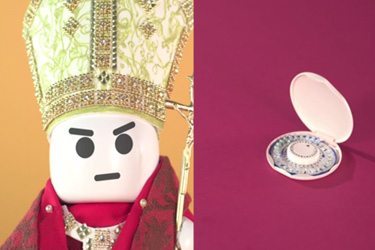Church or State? The Vatican Has Too Much Influence at the UN
It is simply unjust that one religion is allowed to act as a state, and use that power to block rights rather than protect them.

The pope’s groundbreaking comments last week have certainly knocked the wind out of the ultraconservatives’ proverbial sails. And rightfully so. Pope Francis spoke to those who want a bigger church, one that needs all the world’s churches, not just St. Peter’s Basilica in Rome.
Those of us who support this new turn, this acknowledgement that Catholics do disagree on occasion, will have an opportunity, we hope, to see the results in action this week. The United Nations General Assembly is taking place in New York, and it could not come at a more opportune time.
Ever since the Vatican—as the Holy See—joined the UN as a state actor in 1964, without a popular vote, people have asked, “Is the Holy See a church or a state?” Now, a three-minute video (at right) gives some much-needed perspective to the unprecedented situation of allowing a religion to masquerade as a state.
The UN is the place where international norms are set; it is run on the basis of respect for diversity and the protection of rights, including the right to religious freedom. It works mainly through the General Assembly, but also at international conferences—where the Holy See has access that other religions do not. This means that other faiths’ moral reasoning in favor of condoms or abortion access, protections for women or LGBTQ individuals, doesn’t get the same audience as the Vatican, because other religions may only participate as non-governmental organizations.
It is simply unjust that one religion is allowed to act as a state, and use that power to block rights rather than protect them. I’m hopeful that, following Pope Francis’ conciliatory words last week, his diplomats will change their tune at the United Nations. Previously, they have railed against reproductive health services at every opportunity, including issuing statements against sustainable development and opposing a consensus document condemning violence against women.
The pope’s new approach to how the hierarchy interacts with Catholics and non-Catholics alike may now be reflected in its approach to other nations at the UN. For too long, the Vatican has obstructed progress on women’s rights and reproductive rights. Perhaps now, the Vatican’s representatives can stand aside rather than stand in the way.
As the video shows, the Holy See claims to work for “family values” but is home to few women and even fewer families (there are only an average of ten children in Vatican City at any time). In countries where the Catholic hierarchy is powerful, women are jailed after being suspected of abortion, which is not by any stretch of the imagination equivalent to protecting women’s dignity, health, or safety.
Anybody who supports true religious liberty would want religions to be treated equally at the United Nations. And anyone who wants to make their own decisions about sex and relationships would not want conservative religious groups—like the Holy See—to have the power to take away those rights. Just because this situation has been allowed since 1964 does not mean it must continue.
“The Holy See … should be judged by the actual results of its policies,” concludes the video, which calls for a change in the Holy See’s role at the UN.
Read more about the Holy See at the UN here.

